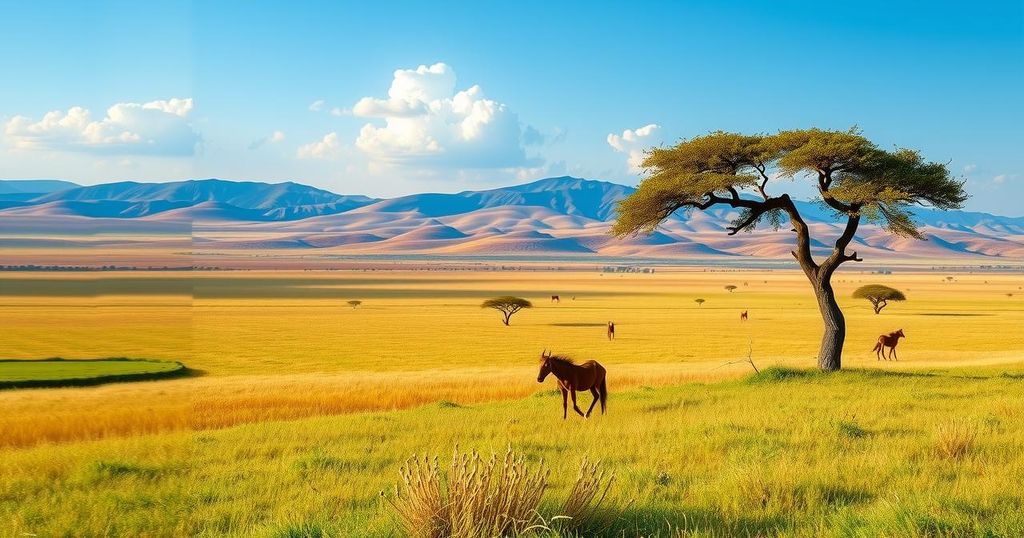Concerns of Land Dispossession Among Tanzania’s Maasai Community Due to Carbon Credits

The Maasai pastoralists in Tanzania are concerned that carbon credit projects are facilitating land dispossession and undermining their traditional way of life. Initiatives such as the Longido and Monduli Rangelands Carbon Project impose unfamiliar grazing practices and complex contracts that threaten their identity. MISA calls for a five-year moratorium to ensure informed consent, arguing that these projects must consider the rights and needs of local communities.
In Tanzania, the indigenous Maasai pastoralists are voicing their serious concerns regarding carbon credit projects which they perceive as a threat to their ancestral lands. The Maasai International Solidarity Alliance (MISA) argues that these initiatives, promoted by global entities, are facilitating a new wave of land dispossession through intricate financial contracts that the community does not fully comprehend. MISA official Ndia Marikoi insists, “We are not against conservation, but these projects must be built on informed consent, not deception.”
Elder Lepilal Ole Saitoti reflects upon the threats emerging from the carbon credit initiatives in Longido. These schemes, intended to offset carbon emissions through conservation investments, have instead converted their ancestral lands into marketable assets, contradicting Maasai traditions. Although designed to promote ecological sustainability, the programs are seen as compounding existing struggles over land rights, further displacing the Maasai and threatening their pastoral lifestyle.
Two significant carbon credit projects now operational in northern Tanzania—the Longido and Monduli Rangelands Carbon Project and the Resilient Tarangire Ecosystem Project—have required local Maasai communities to adopt new grazing practices for carbon credit revenue. However, this unfamiliar concept has left many Maasai feeling pressured into agreements that risk their cultural identity and livelihood. Local mother Naramat Kilepo expresses her frustration: “They came with promises – money, schools, hospitals. They never explained what we were giving up.”
Complex contractual agreements for these projects often restrict Maasai grazing rights and impose new fees, aggravating historical land access issues. Reports indicate that many contracts lack transparency and have inadequately informed consent processes, with significant portions of the community being excluded from important discussions. Elder Mzee Loita poses a crucial question: “How can this be consent?”
MISA has advocated for a five-year moratorium on new carbon projects, asserting that communities deserve adequate time to comprehend the serious implications of these agreements. They have identified that once a contract is signed, decision-making is taken away from the Maasai, as outside administrators assume control, making it challenging for the community to withdraw from unfavorable terms. Legal advisers highlight that these agreements manifest as “contracts of control” rather than equitable partnerships.
The controversy surrounding carbon credits revives historical grievances over land appropriation from the Maasai, as their traditional nomadic grazing practices increasingly clash with imposed rigid grazing structures that limit movement. With carbon initiatives introducing external monitoring and regulatory constraints, the Maasai are facing psychological and economic vulnerabilities that threaten their cattle herding lifestyle, essential for their survival, especially during droughts.
Furthermore, tensions are rising within the community as different villages align variably with carbon deals. Young herder Naiputa Lengai warns, “Our way of life depends on trust. This carbon thing will destroy that.” While proponents of carbon credits argue these projects provide economic benefits, critics emphasize that they perpetuate colonial conservation methods prioritizing ecological goals over indigenous rights. Maasaï activist Timan Tina highlights the cultural stakes, stating, “Without our land, we cannot raise livestock or secure our future.”
The Tanzanian government, while citing commitments to carbon trading, appears to be progressing with initiatives without adequately addressing the Maasai’s concerns. Vice President Philip Mpango has called for enhancing transparency and educational awareness about carbon trading benefits, though responses to requests for comment from government officials remain absent. This situation leaves the Maasai with an uncertain future and calls into question the sustainability and ethics of such conservation projects in their regions.
The emergence of carbon credit projects in northern Tanzania raises significant concerns for the indigenous Maasai community. These initiatives, while intended for environmental conservation, threaten the Maasai’s ancestral lands and cultural identity through complex financial agreements that lack transparency and true informed consent. The juxtaposition of global carbon trading interests against local rights underscores a pressing need for a reevaluation of conservation practices that respect Indigenous communities and their traditional livelihoods. The calls for a moratorium reflect a desire for greater understanding and equitable control over ancestral lands, as the Maasai assert their right to not only survive but thrive on their lands without sacrificing their heritage.
Original Source: www.aa.com.tr






